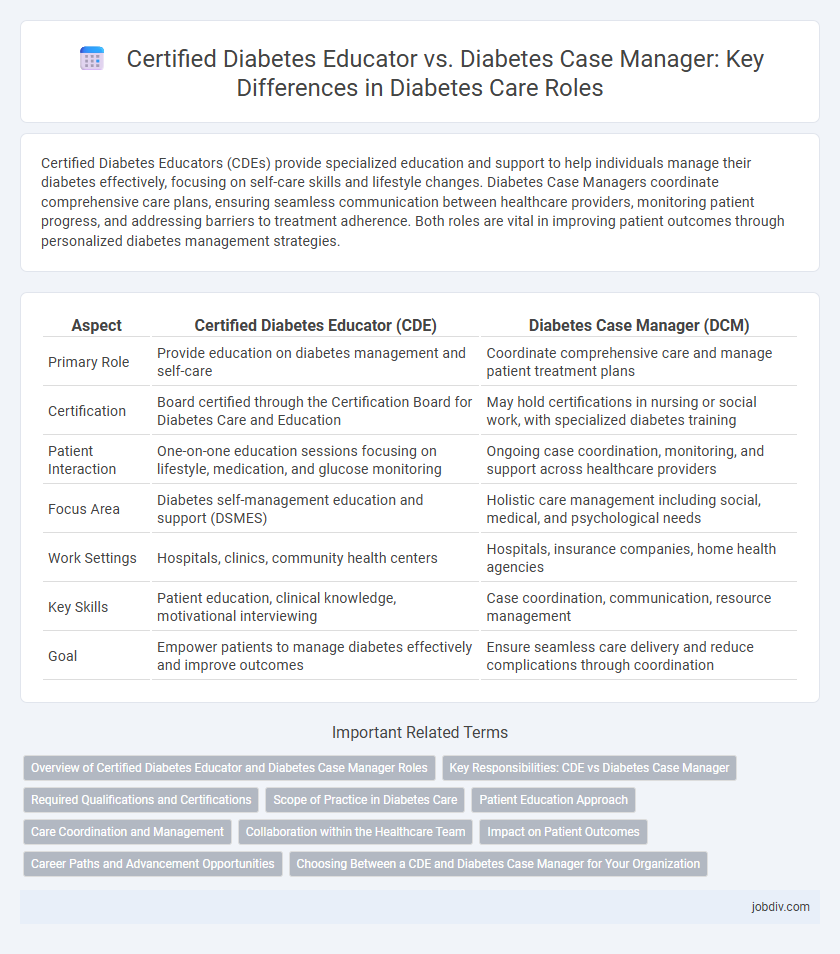Certified Diabetes Educators (CDEs) provide specialized education and support to help individuals manage their diabetes effectively, focusing on self-care skills and lifestyle changes. Diabetes Case Managers coordinate comprehensive care plans, ensuring seamless communication between healthcare providers, monitoring patient progress, and addressing barriers to treatment adherence. Both roles are vital in improving patient outcomes through personalized diabetes management strategies.
Table of Comparison
| Aspect | Certified Diabetes Educator (CDE) | Diabetes Case Manager (DCM) |
|---|---|---|
| Primary Role | Provide education on diabetes management and self-care | Coordinate comprehensive care and manage patient treatment plans |
| Certification | Board certified through the Certification Board for Diabetes Care and Education | May hold certifications in nursing or social work, with specialized diabetes training |
| Patient Interaction | One-on-one education sessions focusing on lifestyle, medication, and glucose monitoring | Ongoing case coordination, monitoring, and support across healthcare providers |
| Focus Area | Diabetes self-management education and support (DSMES) | Holistic care management including social, medical, and psychological needs |
| Work Settings | Hospitals, clinics, community health centers | Hospitals, insurance companies, home health agencies |
| Key Skills | Patient education, clinical knowledge, motivational interviewing | Case coordination, communication, resource management |
| Goal | Empower patients to manage diabetes effectively and improve outcomes | Ensure seamless care delivery and reduce complications through coordination |
Overview of Certified Diabetes Educator and Diabetes Case Manager Roles
Certified Diabetes Educators (CDEs) specialize in providing comprehensive diabetes self-management education, focusing on patient empowerment through individualized teaching about insulin use, nutrition, and lifestyle adjustments. Diabetes Case Managers coordinate care plans, monitor patient progress, and collaborate with healthcare teams to optimize treatment outcomes and reduce hospitalizations. Both roles are vital in diabetes care, with CDEs emphasizing education and behavior change while Case Managers ensure continuity and coordination of care.
Key Responsibilities: CDE vs Diabetes Case Manager
Certified Diabetes Educators (CDEs) specialize in providing personalized diabetes self-management education, focusing on patient training in medication use, blood glucose monitoring, and nutritional counseling to improve glycemic control. Diabetes Case Managers coordinate comprehensive care plans, oversee treatment adherence, facilitate communication among healthcare providers, and manage resources to optimize patient outcomes and reduce hospital readmissions. Both roles collaborate closely with multidisciplinary teams but differ in the scope of patient interaction and administrative coordination.
Required Qualifications and Certifications
Certified Diabetes Educators (CDEs) must obtain the Certified Diabetes Educator credential through the Certification Board for Diabetes Care and Education, requiring a health-related license or degree and at least 1,000 hours of diabetes self-management education experience. Diabetes Case Managers typically hold certifications such as Certified Case Manager (CCM) or Certified Professional in Healthcare Quality (CPHQ) and have backgrounds in nursing or social work, emphasizing care coordination and resource management. The distinction lies in CDEs' specialized diabetes education credentials versus case managers' broader patient management qualifications.
Scope of Practice in Diabetes Care
Certified Diabetes Educators (CDEs) specialize in providing comprehensive diabetes self-management education and support, focusing on behavior modification, blood glucose monitoring, and individualized care plans. Diabetes Case Managers coordinate care by managing treatment protocols, facilitating communication among healthcare providers, and ensuring adherence to medical and insurance guidelines. Both roles are integral to diabetes care but differ in direct patient education versus systemic care coordination within multidisciplinary teams.
Patient Education Approach
Certified Diabetes Educators (CDEs) specialize in delivering personalized patient education, focusing on diabetes self-management skills, medication adherence, and lifestyle modification through evidence-based teaching strategies. Diabetes Case Managers coordinate comprehensive care plans by integrating patient education with clinical management, emphasizing individualized support and resource navigation to optimize health outcomes. Both roles prioritize patient empowerment but differ in scope, with CDEs concentrating on direct education and Case Managers facilitating multidisciplinary collaborations for holistic diabetes care.
Care Coordination and Management
Certified Diabetes Educators (CDEs) specialize in providing personalized diabetes self-management education and support, focusing on patient empowerment through evidence-based strategies. Diabetes Case Managers coordinate multidisciplinary care by managing clinical resources and facilitating communication among healthcare providers to optimize treatment outcomes. Both roles emphasize individualized care plans but differ in scope, with CDEs concentrating on education and behavior modification, while Case Managers prioritize systemic care coordination and resource allocation.
Collaboration within the Healthcare Team
Certified Diabetes Educators (CDEs) specialize in patient education and self-management strategies for diabetes, working closely with physicians, dietitians, and pharmacists to create comprehensive care plans. Diabetes Case Managers coordinate care across multiple providers, ensuring timely interventions, medication adherence, and follow-up appointments to optimize patient outcomes. Both roles emphasize interdisciplinary collaboration to enhance treatment effectiveness and improve quality of life for individuals with diabetes.
Impact on Patient Outcomes
Certified Diabetes Educators (CDEs) deliver specialized education and self-management strategies that significantly improve glycemic control and patient adherence. Diabetes Case Managers coordinate comprehensive care plans, facilitating communication between healthcare providers and patients to reduce hospital readmissions and enhance overall treatment outcomes. Both roles contribute to better patient outcomes by addressing distinct aspects of diabetes management and support.
Career Paths and Advancement Opportunities
Certified Diabetes Educators (CDEs) specialize in providing comprehensive diabetes self-management education and support, often advancing into roles such as clinical coordinators or program directors within healthcare organizations. Diabetes Case Managers focus on coordinating patient care and managing treatment plans, with career growth leading to positions in healthcare administration or specialized chronic disease management programs. Both career paths offer advancement opportunities through certifications, leadership roles, and expanding expertise in patient-centered diabetes care.
Choosing Between a CDE and Diabetes Case Manager for Your Organization
Choosing between a Certified Diabetes Educator (CDE) and a Diabetes Case Manager depends on your organization's specific needs in diabetes care delivery. CDEs provide specialized education on diabetes self-management, treatment plans, and patient empowerment, while Diabetes Case Managers coordinate care, monitor progress, and facilitate communication among healthcare providers. Integrating CDEs enhances patient education outcomes, whereas Diabetes Case Managers improve care continuity and resource utilization, making the decision critical for optimizing diabetes management efficiency.
Certified Diabetes Educator vs Diabetes Case Manager Infographic

 jobdiv.com
jobdiv.com